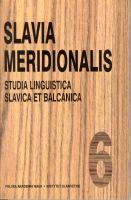Jedno od značenja akuzativne konstrukcije s predlogom za u savremenom srpskom jeziku
One of the Meanings of the Accusative Construction with the Preposition za in the Standard Serbian Language
Author(s): Nada ArsenijevićSubject(s): Language and Literature Studies
Published by: Instytut Slawistyki Polskiej Akademii Nauk
Keywords: Linguistics; Serbian language; Syntax; Accusative with the preposition za ( for ); The verb imati/ have; Negation
Summary/Abstract: The paper analyses those existential sentences whose predication most frequently includes the negated form of the verb imati ( to have ), and the role of the partial beneficiary implies an entity in the accusative with the preposition za ( for ). When compared with the typical situation, where the existence of an entity also implies conditions for the general benefit because its nature allows for that possibility, the discussed examples represent the marked variant. In the majority of cases, negation provides a partial limitation for the beneficiary represented by the prepositional accusative, although the existetence of the entity which could «be at the disposal» is not challenged ( e.g. Nema vode za mene./ There is no water for me ). In the smaller number of examples, markedness is based on the fact that the beneficiary with the affirmative verb has a partial, and not general character ( e.g. Ima vremena samo za mene. / There is time only for me )
Journal: Slavia Meridionalis
- Issue Year: 2006
- Issue No: 06
- Page Range: 9-16
- Page Count: 8
- Language: Serbian

